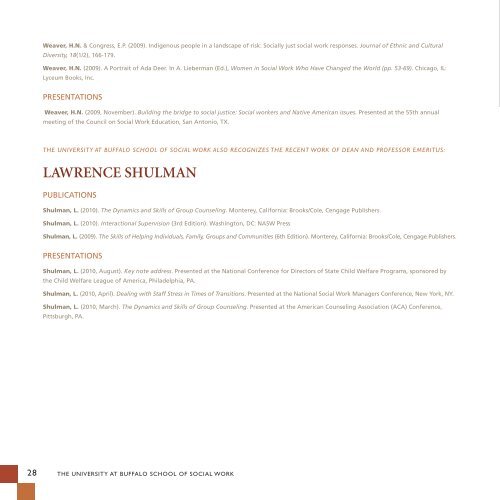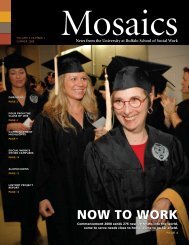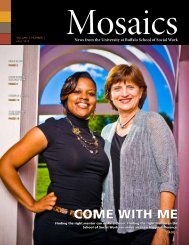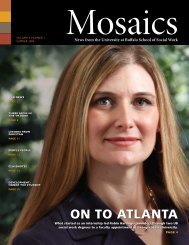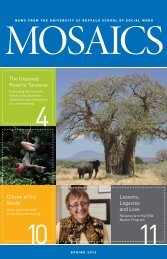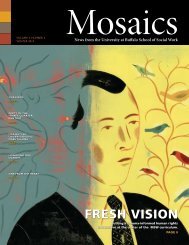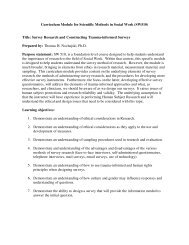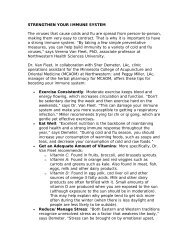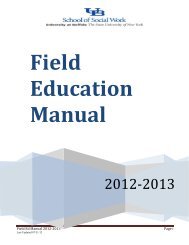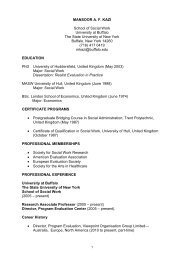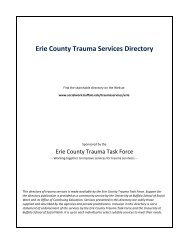the knowledge to change the world - UB School of Social Work ...
the knowledge to change the world - UB School of Social Work ...
the knowledge to change the world - UB School of Social Work ...
Create successful ePaper yourself
Turn your PDF publications into a flip-book with our unique Google optimized e-Paper software.
Weaver, H.N. & Congress, E.P. (2009). Indigenous people in a landscape <strong>of</strong> risk: <strong>Social</strong>ly just social work responses. Journal <strong>of</strong> Ethnic and Cultural<br />
Diversity, 18(1/2), 166-179.<br />
Weaver, H.N. (2009). A Portrait <strong>of</strong> Ada Deer. In A. Lieberman (Ed.), Women in <strong>Social</strong> <strong>Work</strong> Who Have Changed <strong>the</strong> World (pp. 53-69). Chicago, IL:<br />
Lyceum Books, Inc.<br />
LAINA Y. BAY-CHENG<br />
ASSOCIATE PROFESSOR<br />
PRESENTATIONS<br />
Weaver, H.N. (2009, November). Building <strong>the</strong> bridge <strong>to</strong> social justice: <strong>Social</strong> workers and Native American issues. Presented at <strong>the</strong> 55th annual<br />
meeting <strong>of</strong> <strong>the</strong> Council on <strong>Social</strong> <strong>Work</strong> Education, San An<strong>to</strong>nio, TX.<br />
THE UNIVERSITY AT BUFFALO SCHOOL OF SOCIAL WORK ALSO RECOGNIZES THE RECENT WORK OF DEAN AND PROFESSOR EMERITUS:<br />
LAWRENCE SHULMAN<br />
P<strong>UB</strong>LICATIONS<br />
Shulman, L. (2010). The Dynamics and Skills <strong>of</strong> Group Counseling. Monterey, California: Brooks/Cole, Cengage Publishers.<br />
Shulman, L. (2010). Interactional Supervision (3rd Edition). Washing<strong>to</strong>n, DC: NASW Press<br />
Shulman, L. (2009). The Skills <strong>of</strong> Helping Individuals, Family, Groups and Communities (6th Edition). Monterey, California: Brooks/Cole, Cengage Publishers.<br />
PRESENTATIONS<br />
Shulman, L. (2010, August). Key note address. Presented at <strong>the</strong> National Conference for Direc<strong>to</strong>rs <strong>of</strong> State Child Welfare Programs, sponsored by<br />
<strong>the</strong> Child Welfare League <strong>of</strong> America, Philadelphia, PA.<br />
Shulman, L. (2010, April). Dealing with Staff Stress in Times <strong>of</strong> Transitions. Presented at <strong>the</strong> National <strong>Social</strong> <strong>Work</strong> Managers Conference, New York, NY.<br />
Shulman, L. (2010, March). The Dynamics and Skills <strong>of</strong> Group Counseling. Presented at <strong>the</strong> American Counseling Association (ACA) Conference,<br />
Pittsburgh, PA.<br />
Adolescent female sexuality – <strong>the</strong> experiences and feelings <strong>of</strong> young women regarding sexuality – is not one <strong>of</strong> <strong>the</strong> first <strong>to</strong>pics <strong>to</strong> come <strong>to</strong> mind<br />
when people think about social work as a pr<strong>of</strong>ession or academic discipline. Never<strong>the</strong>less it is an issue that taps some <strong>of</strong> <strong>the</strong> fundamental tenets<br />
<strong>of</strong> social work: understanding <strong>the</strong> link between social forces and individual lives; redressing social inequalities and related trauma; and promoting<br />
strengths-based perspectives.<br />
While young women’s sexual well-being may seem like nothing more than gravy – nice, but hardly necessary – it is in fact at <strong>the</strong> crux <strong>of</strong> young<br />
women’s prospects in life. Indeed, <strong>the</strong>re is an extensive body <strong>of</strong> social work and social science research documenting how trauma such as sexual<br />
assault, partner and dating violence, sexually transmitted infections, and unintended pregnancies can derail (even if only temporarily) a woman’s<br />
life. Importantly, research also demonstrates that many <strong>of</strong> <strong>the</strong>se negative outcomes are not <strong>the</strong> fault <strong>of</strong> sexual behavior alone; <strong>the</strong>y are <strong>the</strong><br />
product <strong>of</strong> sexual behavior that occurs in <strong>the</strong> context <strong>of</strong> relational power differences and inadequate social and material resources. Various<br />
permutations <strong>of</strong> sexism, racism, and poverty can combine <strong>to</strong> both heighten young women’s vulnerability <strong>to</strong> negative sexual events and obstruct<br />
<strong>the</strong>ir access <strong>to</strong> <strong>the</strong> supports needed <strong>to</strong> recover from <strong>the</strong>m.<br />
My scholarship focuses on how young women navigate <strong>the</strong> complex intersection <strong>of</strong> social norms (especially those regarding gender, sexuality,<br />
and adolescence) and social location (especially gender, socioeconomic status, race and ethnicity). I have used a variety <strong>of</strong> research methods <strong>to</strong><br />
explore <strong>the</strong>se issues, but am particularly interested in methods that not only catalog adolescent women’s sexual behaviors but also afford insight<br />
in<strong>to</strong> contexts and meanings <strong>of</strong> those behaviors. To this end, I developed <strong>the</strong> Sexual Life His<strong>to</strong>ry Calendar (SLHC), an interview pro<strong>to</strong>col that elicits<br />
retrospective and nuanced accounts <strong>of</strong> young women’s adolescent sexual experiences. The SLHC uses a calendar on which all <strong>of</strong> a participant’s<br />
landmark life events, including her sexual and relationship experiences, are recorded. This allows <strong>the</strong> researcher, as well as <strong>the</strong> participant herself,<br />
<strong>to</strong> see and consider sexuality in <strong>the</strong> context <strong>of</strong> o<strong>the</strong>r life experiences. It is my hope that <strong>the</strong> SLHC provides not only rich and meaningful data for<br />
researchers, but also a rich and meaningful experience for participants.<br />
SPOTLIGHT: FACULTY<br />
Thus far, I have worked using data collected during a pilot study <strong>of</strong> <strong>the</strong> SLHC (funded by <strong>the</strong> Les Brun Pilot Study Program through <strong>the</strong> Buffalo<br />
Center for <strong>Social</strong> Research) <strong>to</strong> examine how gender roles leave young women vulnerable <strong>to</strong> varying degrees <strong>of</strong> sexual coercion, while social norms<br />
surrounding personal responsibility lead <strong>the</strong>m <strong>to</strong> accept blame for <strong>the</strong>se experiences (Bay-Cheng & Eliseo-Arras, 2008). With colleague Dr. Adjoa<br />
Robinson, and Dr. Alyssa Zucker at George Washing<strong>to</strong>n University, I reviewed young women’s subjective perceptions <strong>of</strong> various sexual behaviors<br />
in <strong>the</strong> context <strong>of</strong> different relationship types (Bay-Cheng, Robinson, & Zucker, 2009). In addition, I am currently using a grant from <strong>the</strong> Fahs-Beck<br />
Fund <strong>to</strong> conduct SLHC interviews with young women in foster care <strong>to</strong> understand <strong>the</strong> meaning and place <strong>of</strong> sexuality in <strong>the</strong>ir lives.<br />
It is my hope that this work will contribute <strong>to</strong> a growing call for adults, whe<strong>the</strong>r as researchers, practitioners, or family members, <strong>to</strong> attend more<br />
closely <strong>to</strong> <strong>the</strong> relevance <strong>of</strong> adolescent female sexuality <strong>to</strong> our broader mission for social justice.<br />
28 THE UNIVERSITY AT BUFFALO SCHOOL OF SOCIAL WORK<br />
THE UNIVERSITY AT BUFFALO SCHOOL OF SOCIAL WORK 29


